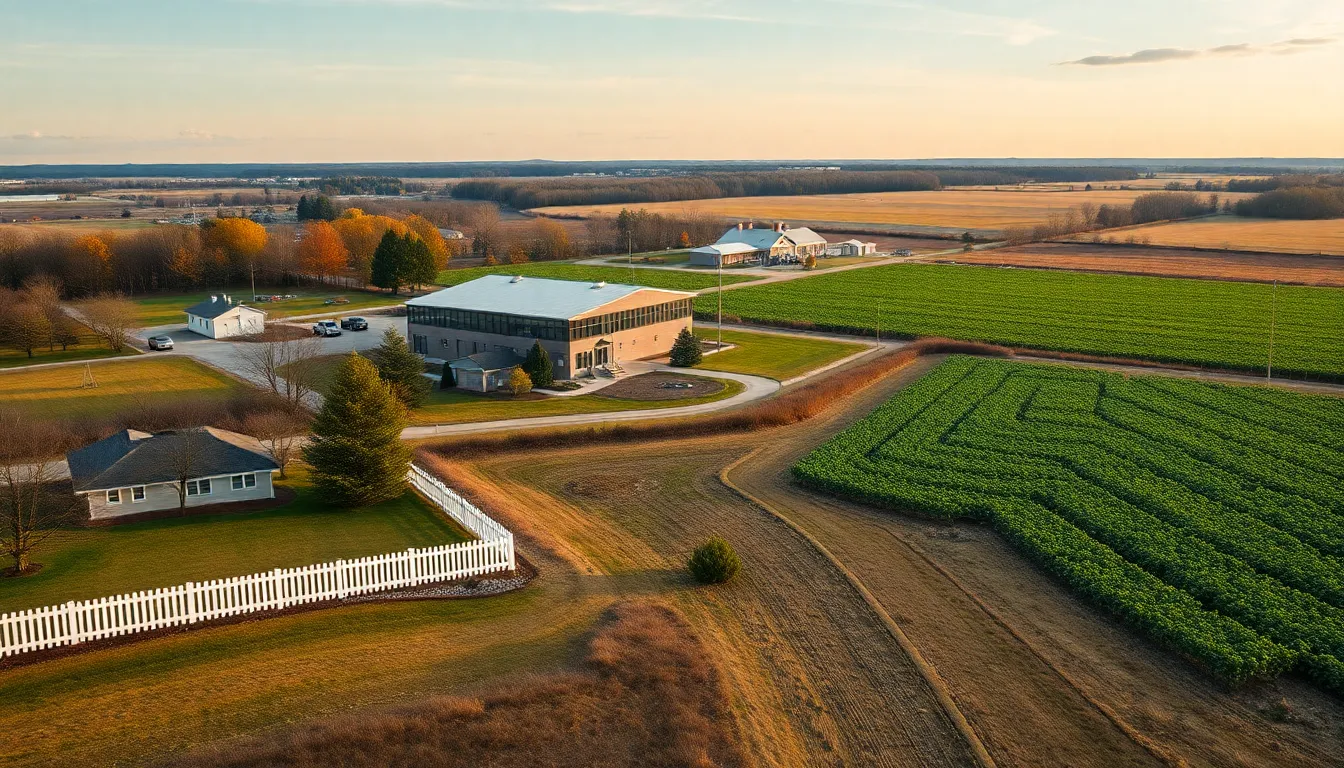Table of Contents
ToggleConnecticut offers a unique blend of charm and opportunity for those looking to invest in land. With its picturesque landscapes and rich history, the state attracts a diverse range of buyers, from aspiring homeowners to seasoned investors. Whether it’s a sprawling plot in the countryside or a small parcel near vibrant urban centers, land for sale in CT presents a wealth of possibilities.
As demand for real estate continues to grow, understanding the local market becomes essential. Buyers can find everything from wooded retreats to prime commercial sites, each with its own potential for development or personal use. This article will explore the current trends, tips for purchasing land, and the benefits of owning property in this beautiful state.
Overview of Land for Sale in CT
Land for sale in Connecticut offers diverse opportunities for buyers, with options ranging from residential to commercial and recreational properties. The state’s varied topography and rich natural resources enhance its appeal. Buyers can find parcels featuring lush woodlands, open fields, and waterfront access.
Current market trends indicate a steady demand for vacant land, fueled by urban migration and a desire for more space. The average price per acre varies significantly based on location and land type; prices can range from $10,000 to over $100,000. Urban areas such as Hartford and New Haven typically command higher prices, while rural regions offer more affordable options.
Purchasing land in Connecticut involves understanding zoning regulations, local development plans, and environmental considerations. Potential buyers should consider factors like site access, utilities availability, and soil quality, which can influence long-term investment value.
Investors and buyers can explore listings on specialized real estate websites or engage local agents who understand the nuances of the Connecticut market. Conducting thorough research and due diligence proves essential in securing the right property to meet individual needs.
Types of Land Available

Connecticut offers a diverse range of land types, catering to various needs and preferences. Buyers can find options ranging from residential plots to commercial sites and agricultural fields.
Residential Land
Residential land consists of plots designated for home construction or development. Properties vary in size, from small lots in suburban neighborhoods to larger parcels suitable for custom-built homes. Buyers often seek land in proximity to schools, amenities, and transportation. Various zoning regulations influence residential development, making it essential to investigate local laws for building permits and restrictions.
Commercial Land
Commercial land includes properties intended for business development, including retail, office spaces, and industrial facilities. Locations near major highways or urban centers typically command higher prices due to accessibility and visibility. Buyers look for land with zoning that permits commercial activities, ensuring alignment with business objectives. Understanding market demand and local economic trends provides clarity on investment potential in this sector.
Agricultural Land
Agricultural land encompasses properties used for farming, forestry, or other agricultural ventures. Sizes range from small homesteads to extensive farms. Buyers interested in sustainable farming practices or agribusiness opportunities find value in assessing soil quality, water resources, and local agricultural regulations. Land designated for agriculture can offer significant investment opportunities, particularly with increasing demand for locally sourced produce and green initiatives.
Factors to Consider When Buying Land
Several factors influence the decision to buy land, particularly in Connecticut’s diverse market. Understanding these aspects can significantly impact investment success.
Location and Accessibility
Location plays a critical role in land valuation. Buyers must assess proximity to essential services like schools, shopping centers, and healthcare. Additionally, accessibility to major highways and public transportation enhances a property’s desirability. Invest in land with good road conditions and sufficient access to ensure convenient transit for both personal and commercial use.
Zoning Regulations
Zoning regulations dictate how land can be used and can vary significantly between towns. It’s vital for buyers to research local zoning laws that apply to potential purchases. Knowing whether a property is zoned for residential, commercial, or agricultural use helps prevent future conflicts. Buyers should also inquire about any potential zoning changes that might affect the land’s suitability for their intended purpose.
Environmental Considerations
Environmental factors impact the usability and value of land. Buyers must evaluate soil quality, water availability, and flood zones, which can influence construction and cultivation. Assessing proximity to protected natural resources guarantees compliance with environmental regulations and sustainable land use. Seeking environmental assessments or expert opinions before purchasing ensures a sound investment and minimizes future liabilities.
Benefits of Purchasing Land in CT
Investing in land in Connecticut offers numerous advantages, particularly with increasing demand for properties. Buyers can tap into the state’s opportunities for investment and development.
Investment Potential
Investment in land comes with significant potential for appreciation. Connecticut’s real estate market reflects steady demand, driven by urban migration and the desire for open spaces. The value of land often increases over time, especially in areas experiencing growth or development. Factors like proximity to urban centers, planned infrastructure improvements, and zoning changes contribute to this appreciation. Buyers aiming for long-term returns should consider areas with emerging development plans and favorable growth forecasts.
Development Opportunities
Purchasing land in Connecticut opens various development opportunities. Residential land permits construction of homes, catering to the rising population seeking new housing options. Commercial land promotes business expansion, attracting opportunities for retail, offices, or industrial ventures, particularly near major highways or urban locales. Agricultural land serves as an avenue for sustainable practices in farming, tapping into the growing demand for local produce. Buyers should evaluate zoning regulations and local development plans to identify the best-fit projects for their land, enhancing their investment’s value.
Investing in land in Connecticut presents a unique opportunity for buyers looking to capitalize on the state’s growing appeal. With a variety of options available from residential to commercial and agricultural plots there’s something for everyone. Understanding local market trends and zoning regulations is crucial for making informed decisions.
As urban migration continues and demand for space increases the potential for appreciation in land value is significant. Buyers should remain proactive and engage with local real estate professionals to navigate this dynamic market. With careful consideration and research land ownership in Connecticut can be a rewarding venture.




